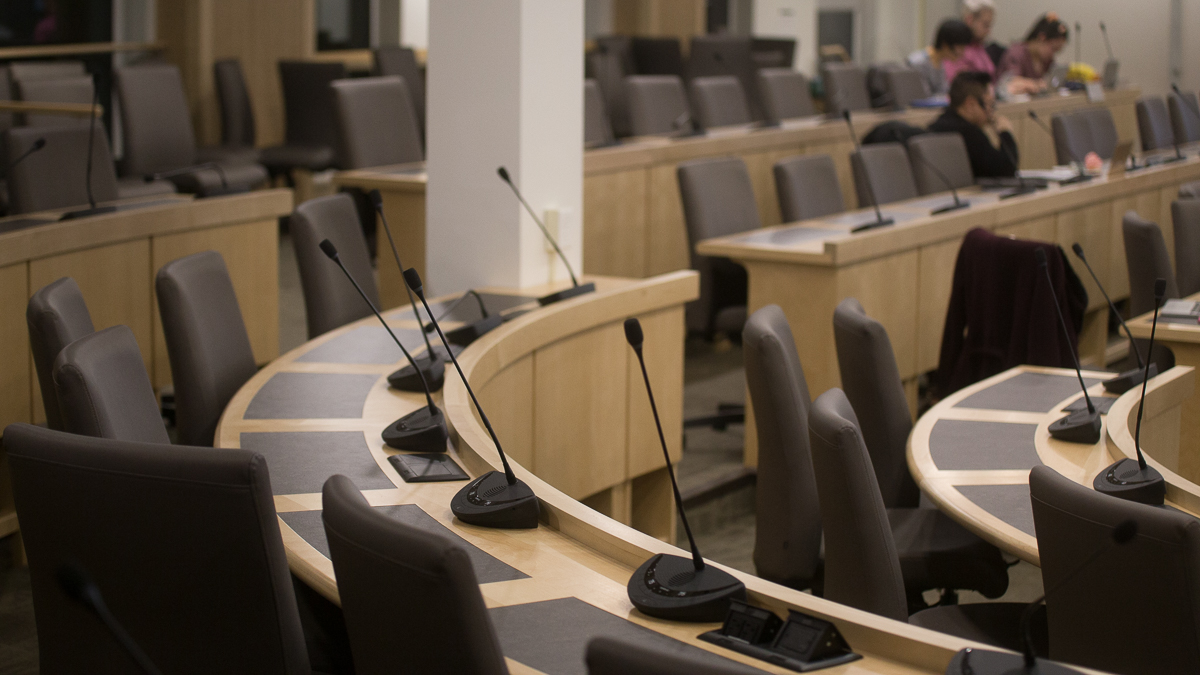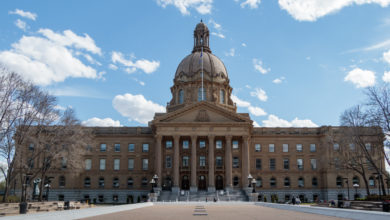 Rosty Soroka
Rosty SorokaThe Board of Governors is the highest decision-making body at the University of Alberta. Two undergraduate students have the opportunity to represent the U of A undergraduate student body consisting of over 30,000 students. You’d think that this representative would be voted for publicly and the candidates’ speeches made public. Turns out you’d be wrong.
On January 25, the Students’ Council meeting included the Board of Governors (BoG) representative replenishment vote, to fill the vacancy left by the resignation of previous BoG representative Dave Konrad. The new representative, Adrian Wattamaniuk, will serve for the remainder of the 2021-22 term.
The appointment of Wattamaniuk is a bleak reminder of how little transparency the Students’ Union (UASU) and Council have in their proceedings. That’s not to say that Wattamaniuk is a poor representative for undergraduate students — there’s just no comparison; we don’t know what any of the candidates wanted to do, or what their platforms were. When Students’ Council made the decision to move in-camera — a closed session that no member of the public can watch — for the replenishment vote, no one could have guessed that their discussion would end with a candidate already selected. After about two hours of waiting, the group emerged with a name on tongue, but no public candidate platforms, speeches, discussion, or public vote held.
Students deserve to listen to the beliefs and goals of the undergraduate representative that will be their voice on the BoG, a board that makes important decisions about things like increasing tuition. Moving the entire discussion in-camera prevented this from happening.
There are reasons why closed discussion exists. When discussion involves legal implications that can harm the Students’ Union, that’s a good reason to move in-camera. A replenishment election isn’t one of them.
When making a decision like who will represent the entire undergraduate student body at the highest decision-making body at the U of A, asking for discussions and a vote to be done publicly is not too much to ask.
Chanpreet Singh, an undergraduate student in the faculty of engineering present at the meeting that night, described the whole situation to be “disappointing.” Singh is also president of the International Students’ Association (ISA) but did not attend the meeting or make his complaint in his capacity as a representative of the ISA.
“It just made me feel that they’re ignoring… their responsibility for their own constituents,” Singh said. “The whole process overall lacks transparency. You are not electing somebody to be representing the Students’ Union — you’re not electing an SU [proxy] or something, you’re literally electing an undergraduate Board of Governors representative.”
“There’s a clear lack of transparency and overall, acting in secrecy because I don’t see any need [for] going in-camera.”
Singh had attended the meeting that night in the hopes of hearing the candidates’ speeches, figuring out which candidate would speak out for student interests best. Instead, he was met with hours of waiting, with a “blunt announcement” of the winner.
“As an undergraduate student, I am entitled to listen to who is there [that] is going to represent me, and that was an opportunity that I think we really missed out [on as] undergraduate students in the room that day,” Singh explained.
“At the end of the day, you’re electing somebody to represent somebody else… and those being represented, they themselves don’t know who is representing them now.”
While the post on the UASU Elections Instagram page about the Students’ Council meeting mentions in the caption that the voting will occur in private, their Facebook page doesn’t. Instead, the post states, “While only members of the Student Council can vote, everyone is welcome to follow the conversation at 6 p.m. to see how the election goes!” This does not explicitly mention that attendees will be unable to see candidates’ speeches — it actually implies the opposite.
Rowan Ley, president of the UASU, mentioned that the Instagram caption had been promptly edited to correctly reflect how the candidates’ speeches and voting would be presented. The Instagram post had previously used the same caption as the Facebook post, but Ley “noticed about half an hour” after it was published that it did not accurately reflect the meeting’s procedure and was corrected.
“The Instagram post was edited less than an hour after being initially posted to fix the mistake and make sure it was accurate. It seems like they must have forgotten to edit the Facebook post when they fixed the Instagram post.”
If an attendee had joined the meeting that night from the Facebook post or the initial Instagram post expecting to “follow the conversation,” they would have been sorely mistaken.
Importantly, the choice to hold the election in-camera potentially violates the Students’ Council’s own legislation. As outlined in the standing orders, which outline how Students’ Council must be run, the only things permitted in-camera are “discussion or information items.” Though the replenishment election’s candidate interviews and discussions are permitted in-camera under this definition, the voting itself isn’t, as it’s an action item.
Singh has taken the potential legislation violations to the Discipline, Interpretation, and Enforcement Board (DIE Board), where it awaits judgment. The DIE Board is the judiciary branch of the UASU committees and boards; they interpret and reinforce bylaws.
“I personally have no harsh feelings towards any of the candidates — I think all the candidates are quite competent and they might’ve given quite good interviews and everything, so there’s nothing against the final decision and who they appointed; it’s [mostly] about the frustration,” Singh said.
“From your Students’ Union, you expect more — you expect more transparency, especially when you’re paying for the Students’ Union, [to]… represent you at the end of the day.”
Ley clarified that the existence of the bylaw is to ensure secret motions can’t be passed.
“If we were passing secret motions where people did not know what we were voting on or what the outcome was, yes, it would be a problem,” Ley said. “Discussion about a topic can happen in-camera (discussion item) as long as the vote itself is public.”
Votes that happen ex-camera can proceed in multiple ways. In this case, a preferential ballot would have been done virtually through a Google Form. Philip Miheso, council’s speaker, would send the link to the form in the Zoom chat, where only voting members of council would submit their vote.In this case, however, the voting link was distributed when council was in-camera.
“But the point is that it doesn’t change anything — the results were published, and the discussion would have been in-camera regardless, and nobody who isn’t a councillor would have been able to open the link. Putting the link in the chat while in-camera versus ex-camera would not have changed transparency or the outcome of the vote at all.”
Ley called the situation “at worst… a small procedural oversight,” but this small procedure is put in place for transparency. Transparency is increased when following the rules set by council’s standing orders, not when they’re brushed aside. This is a dangerous slippery slope for student governance. If not this time, then what about next time?
In reaction to the DIE Board filing, Philip Miheso, the council’s speaker, submitted a response form. The form addresses the accusations made by Singh, and notably — addresses the claim by Singh that the UASU “acts in secrecy.”
“But more importantly, the suggestion that Council mostly acts in secrecy is baseless and is not substantiated in any way,” the response reads.
This statement is a hard pill to swallow when most action items are voted on using secret ballot. While you can view the votes cast by your elected officials at the House of Commons, Legislative Assembly of Alberta, and even Edmonton’s City Council, you can’t view those cast by your student representatives through a secret ballot. Though the total votes for or against the motion are released, the voting history of each representative isn’t published. Secret ballot is used if no councillors request to vote by roll call or division. However, this request rarely happens. Therefore, voting by secret ballot is the standard — but it shouldn’t be.
This isn’t an issue that plagues all post-secondary governance. There are universities out there with more transparent structures. For example, both McGill University and the University of British Columbia‘s student councils have voting records, where students can view exactly what votes were made by which representatives. It’s high time the UASU followed their lead.
The concept of having a student representative means that the representative should stand for your values and beliefs, but how can this be verified when the votes your representative makes are secret? The Students’ Council meeting on January 25 also included motions to move several student group referenda topics to the Bylaw Committee. These were done through a secret ballot.
Ley commented that the reason for an in-camera discussion and secret ballot during the BoG representative vote was to protect individual councillors and to allow them to make the best voting choices.
“Councillors have to work together for many more months, and this is particularly relevant this year when serious allegations of bullying and harassment… have been made by councillors earlier this year,” Ley said.
“This is notably different from a general election, where candidates have little ability to punish people who vote against them. Confidential interviews and secret ballots are essential to ensure councillors can choose the best candidate freely on the basis of merit.”
While bullying is never condoned, it should also not be the reason transparent processes are forgone. When bullying and harassment becomes such a big issue that it impedes students’ ability to access information about their own representatives and how they act on their behalf, it should be dealt seriously with by council. Using secret ballots and confidential interviews punishes students, who are unable to hold their elected — and nominated — representatives accountable.
For students representing their constituents in the student body, those constituents have the right to see what their representatives are doing in their name. After all, the voting choices could be a crucial part of deciding whether or not to re-elect an incumbent councillor or Students’ Union executive. The secret ballot’s main purpose is to protect the average voter from those that perceive their vote to be unsavoury, or challenge their authority, but being an elected representative makes this obsolete — the same thing protecting an employee voting against their employer is not the same as having accountability in government.
Despite the Students’ Union’s claim to “open, transparent governance,” this particular instance paired with the historical lack of transparency from student governance continues to prove that there’s a long way to go.




